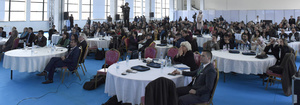GIZ - RETech Conferenc in Algier

Private Sector cooperation in the circular economy: Experiences from Germany
March 27, 2018 in Algier, SAFEX, Pavillon « Ahaggar »
Nowadays the German waste management branch is known as one of the worldwide leading systems on all concerned levels: The legislative and enforcing governmental framework, the technology development and implementation, the operations and reimbursement models, as well as the science-based research sector. The status quo of waste management in Germany was a long-term development based on regulatory measurements and the responding technology and/or operational optimizations in an iterative setup during the last decades. For Algeria, German companies and organizations cannot only offer technical support, private and public investment cooperation or technical and legislative consultancy service. German waste management specialists from all involved sectors can especially support the Algerian waste management branch to avoid previous mistakes and adopt “lessons learned” of the German waste management development phase – with the target to accelerate the overall waste management development of Algeria for a healthier environment, a growing waste management industry and therefore to increase income generation and specialized job creation in an emerging region and a growing branch.
Under the umbrella of the international exhibition for environmental and renewable energy solutions in Alger, hosted by the Algerian Ministry of Environment and Renewable Energies on 26-28 March 2018 („Salon International d’Environnement et des Énergies Renouvelable, Alger (SIEERA)“), the Deutsche Gesellschaft für Internationale Zusammenarbeit (GIZ) and its partners organized an international conference with German specialists from all waste-related sectors to share impressions of the current German waste management system and its recent development. The focus of all presentations laid on possible implementation approaches for Algeria and lessons learned from the German development – addressed to the attending Algerian stakeholders, which represented the Algerian Ministry of Environment and Renewable Energies, executive governmental/municipal organizations and the Algerian private waste management sector.
Inaugurated by the H.E. Minister of Environment and Renewable Energies Ms. Fatma Zohra Zerouati, Ms. Susanne Wahl (GIZ country director Algeria) and Mr. Michael Peter Zenner (German Ambassador to Algeria), the international conference started with 5 specialized presentations representing all waste-related stakeholders of the German waste management sector. Ms. Dr. Anja Meutsch (German Federal Ministry for the Environment, Nature Conservation and Nuclear Safety) described the waste-related legislative development of Germany during the last decades and its effect on the public and private waste management sector. Mr. Friedrich Sonderhoff (Berliner Stadtreinigung) shared detailed organizational and technical experiences of one of the largest municipal waste services organizations in Germany. Based on the legislative and municipal insights, Mr. Arne Grewe (wastecon AG) presented technical possibilities to optimize an existing basic waste management system in developing regions. The German RETech Partnership, an official German waste management branch association, was represented by Mr. Kevin Negoro Kasih, who elaborated possibilities of Algerian-German waste management cooperations on a public and private business level as bridge between the markets. Ms. Agnes Bünemann (cyclos GmbH) concluded the presentation round with detailed insights on how to implement strategic legislative and organizational measures such as the model of an extended producer responsibility, into existing developing waste management markets.
Together with Algerian representatives of the public and private sector, all German speakers and delegation members discussed the possible implementation of different legislative and technical waste management approaches in Algeria within a final panel discussion, which also gave room for all requests by the interested audience.